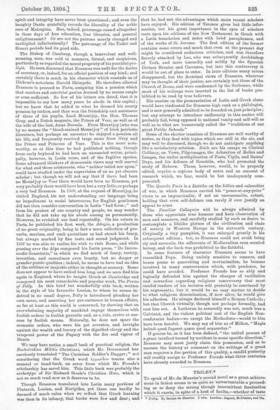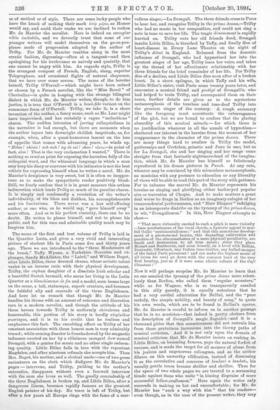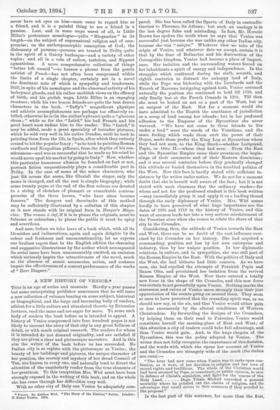TRILBY.*
To speak of Mr. du Manner's second novel as a great achieve- ment in fiction seems to us quite as unwarrantable a proceed- ing as to deny the strong though intermittent fascination which it exerts, in spite of a host of faults,—whether of taste • Trilby. By George du Maurier. $ vols. London 3 Osgood, hicIlvaine, and Co, or of method or of style. There are some lucky people who have the knack of making their mark as-4 FOpoy, as Homer would say, and amid their ranks we are inclined to reckon Mr. du Manlier the novelist. Here is indeed an exemplar vitiis imitabile, and we devoutly trust that none of our younger writers will model themselves on the go-as-you- please mode of progression adopted by the author of Trilby. For Mr. du Manner rambles along in the most erratic fashion, digressing—often at a tangent—and then apologising for his irrelevance so naïvely and quaintly, that one cannot be angry with him. As regards style, Trilby is the strangest compost of French, English, slang, superior Telegraphese, and occasional flights of natural eloquence, that we have ever come across. The name of the heroine herself, Trilby O'Ferrall—which might have been coined or chosen by a French novelist, like the "Miss Rovel " of Cherbuliez—is quite in keeping with the strange bilingual dialect in which Mr. du Manner writes, though, to do him justice, it is true that O'Ferrall is a bona-fide variant on the commoner form of O'Farrell. Trilby, we take it, is a sheer invention of the author, a fancy name, such as Mr. Lear might have improvised, and has certainly a vague " meloobious " charm. The sudden intrusion of jarring colloquialisms in the narrative is bad enough, but there are moments when the author lapses into downright chilclieh ineptitude, as, for example, when, after a quasi-humorous lament on the loss of appetite that comes with advancing years, he winds up, " Bolas ! ahimb ! ach weh ! ay de mi ! eheu ! orf.4oi,—in point of fact, alas! That is the very exclamation I wanted." There is nothing so cruel as print for exposing the harmless folly of the colloquial word, and the whimsical language in which a man may keep his diary or converse with his intimates is not the best vehicle for expressing himself when he writes a novel. Mr. du Maurier'e desipience is very sweet, but it is often so inoppor- tune as to make the sympathetic reader positively blush. Still, we freely confess that it is in great measure this artless indiscretion which lends Trilby so much of its peculiar charm. It is simply and confessedly a revelation of the writer's individuality, of his likes and dislikes, his accomplishments and his limitations. There never was a less self-effacing author, or one who, as he would say, "gave himself away" more often. And as to his perfect sincerity, there can be no doubt. He writes to please himself, and not to please his public, and for this rare and admirable quality much may be forgiven him.
The scene of the first and best volume of Trilby is laid in the Quartier Latin, and gives a very vivid and interesting picture of student life in Paris some five and thirty years ago. There we are introduced to the three Musketeers of the brush," Taffy Wynne, a Yorkshire Hercules and ex- plunger, Sandy McAllister, the "Laird," and William Begot, alias Little Billee, three devoted chums, whose artistic talent varies in an inverse ratio with their physical development. Trilby, the orphan daughter of a dissolute Irish scholar and a beautiful Scotch barmaid, who earns her living in the Latin Quarter as a blanchisseuse de fin and a model, soon looms large on the scene, a tall, statuesque, superb creature, and becomes the faithful ally and comrade of the three Englishmen. And here let us remark that though Mr. da Maurier handles his theme with an amount of reticence and discretion rare in a modern novelist, and though the attitude of his three heroes towards Trilby is uniformly chivalrous and honourable, this portion of his story is hardly virginibus puerisque, and it is to his credit that he realises and emphasises this fact. The ennobling effect on Trilby of her constant association with three honest men is very admirably traced ; while coming disaster is foreshadowed by the magnetic influence exerted on her by a villainous mongrel Jew named Svengali, with a genius for music and no other single redeem. ing quality. Little Billee falls in love with the repentant Magdalen, and after nineteen refusals she accepts him. Then Mrs. Bagot, his mother, and a clerical uncle—one of two gross caricatures on the cloth which disfigure Mr. du Maurier's pages — intervene, and Trilby, yielding to the mother's entreaties, disappears without even a farewell interview with the man she loves so well. The goodly comradeship of the three Englishmen is broken up, and Little Billee, after a dangerous illness, becomes rapidly famous as the greatest English painter of his day. No trace is left of Trilby, but after a few years all Europe rings with the fame of a mar- ve]Ious singer,—La Svengali. The three friends cross to Paris to hear her, and recognise Trilby in the prima donna,—Trilby who had no music in her composition, and could not sing a note in tune to save her life. The tragic denouement is rapidly hurried on. Trilby cuts her old friends dead, Svengali insults Little Billee, is thrashed by Taffy, and finally dies of heart-disease in Drury Lane Theatre on the night of Trilby's debut in England. Released from the demonic influence of Svengali, who had hypnotised her into the greatest singer of her age, Trilby loses her voice, and takes up the thread of her affectionate relationship with her three friends for the brief remainder of her life. For Trilby dies of a decline, and Little Billee dies soon after of a broken heart. In a short epilogue, in which Taffy and his wife, Little Billee's sister, visit Paris some twenty years later, and encounter a musical friend and protege of Svengali's, who had helped to train Trilby, and accompanied them on their tours, further details are given as to the mysterious metamorphosis of the tuneless and tone-deaf Trilby into the greatest singer of the century. A rough summary like the foregoing must accentuate the extravagances of the plot, but we are bound to confess that the glaring absurdity of this musical miracle — for which there is no justification whatever in all the annals of hypnotism— shattered our interest in the heroine from the moment of her reappearance in the character of the prima donna. There are many things hard to swallow in Trilby the model, guttersnipe and Gretchen, grisette and Juno in one; but as for La. Svengali, she and her singing and her songs come straight from that fantastic nightmare-land of the imagina- tion, which Mr. du Maurier has himself so felicitously reproduced in his dream pictures in Punch. At any rate, whoever may be convinced by this miraculous metamorphosis, no musician with any pretence to education or any liberality of views will be able to read this part of the story with patience. For to enhance the marvel Mr. du Maurier represents his heroine as singing and glorifying either hackneyed popular airs or travesties of Chopin. And to make matters a great deal worse he drags in Berlioz as an imaginary eulogist of her transcendental performances, and "Herr Blagner " indulging in an intemperate diatribe on the tyranny of the prima donna, to wit, " Svengalismus." In this, Herr Blagner attempts to show- " That mere virtuosity carried to such a pitch is mere viciosity —base acrobatismus of the vocal chords, a hysteric appeal to mor- bid Gallic ° sentimentalismus ; ' and that this monstrous develop- ment of a phenomenal larynx, this degrading cultivation and practice of the abnormalismus of a mere physical peculiarity, are death and destruction to all true music; since they place Mozart and Beethoven, and even himseif, on a level with Bellini, Donizetti, Offenbach, any Italian tune-tinkler, any ballad-monger of the hated Paris pavement ! and can make the highest music of all (even his own) go down with the common herd at the very first hearing, just as if it were some idiotic refrain of the Café Chantant ! '
Now it will perhaps surprise Mr. du Maurier to learn that DO one assailed the tyranny of the prime donne more relent- lessly than Berlioz, who called them "regular monsters," while as for Wagner, who is so transparently assailed in this silly parody, it is equally notorious that he had a very cordial admiration for Bellini, and the "pure melody, the simple nobility, and beauty of song," to quote his own words, which are to be found in Bellini's operas. Mr, du Maurier is careful to inform us in another passage that he is no musician—that indeed is pretty obvious from his description of Svengali's magic flageolet—and it is a thousand pities that this consciousness did not restrain him from these gratuitous incursions into the thorny paths of musical criticism. And it is not only upon the domain of musical criticism that Mr. du Manlier insists on rushing in. Little Billee, on becoming famous, pays the natural forfeit of success, and is made the target for all manner of abuse from his jealous and ungenerous colleagues, and as the author dilates on this unworthy vilification, instead of dismissing it as the correlative and converse of laudari a laudato, his usually gentle tones became shriller and shriller. Thus for the space of two whole pages we are treated to a screaming tirade against those who unite "in hissing dispraise of more successful fellow-craftsmen." Here again the writer only succeeds in making us hot and uncomfortable ; for Mr. du Manlier has "such a way with him" that his readers— even though, as in the case of the present writer, they may never have set eyes on him—soon come to regard him as a friend, and it is a painful thing to see a friend in a passion. Last, and in some ways worst of all, is Little Billee's portentous monologue—quite "Blagnerian " in its length—on the subject of supernatural religion and of corn- promise; on the anthropomorphic conception of God ; the dishonesty of parsons—parsons are treated in Trilby quite in the spirit of a Gaiety burlesque—and a variety of other topics; and all in a vein of callow, tasteless, and flippant agnosticism. A more comprehensive collection of things "better left unsaid "—to borrow a phrase from the gentle satirist of Punch—has not often been compressed within the limits of a single chapter, certainly not in a novel the dominant note of which is sympathy and tenderness. Still, in spite of his monologue and the abnormal activity of his lachrymal glands, and his rather snobbish views on the efficacy of birth, and his girlish ways, Little Billee is an engaging creature; while his two bosom friends are quite the best drawn characters in the book. " Taffy's " magnificent physique and athletic accomplishments are perhaps too effusively ex- tolled, otherwise he is (in the author's phrase) quite a "glorious chum ; " while as for the "Laird," his bad French and his good heart soon endear him to the reader. The "Laird," it may be added, made a great speciality of toreador pictures, which he sold very well in his native Dundee, until he took to painting them from the life, in Spain, after which they entirely ceased to hit the popular fancy ; "so he took to painting Roman cardinals and Neapolitan pifferari, from the depths of his con- sciousness—and was so successful that he made up his mind he would never spoil his market by going to Italy." Now, whether this particular humorous allusion be founded on fact or not, portrait fiction unquestionably plays a considerable part in Trilby. In the case of some of the minor characters, who just flit across the scene, like Glorioli the singer, only the name is changed, and all the rest is simple biography ; while some twenty pages at the end of the first volume are devoted to a string of sketches of pleasant or remarkable contem- poraries of the three heroes, "who have since become famous." The dangers and drawbacks of this method may be sufficiently illustrated by a collation of this chapter as it now stands with its original form in Harper's Maga- zine. The roman t clef, if it is to please the originals, must bo fulsome or colourless ; to please the public it must be spicy and scurrilous.
And now, before we take leave of a book which, with all its blemishes and indiscretions, again and again delights by its colour and freshness and unconventionality, let us express our liveliest regret that in the English edition the charming and suggestive illustrations by the author which accompanied its serial issue have been unaccountably omitted, an omission which seriously impirs the attractiveness of the novel, much as the absence of scenic accessories, action, and costume impair the effectiveness of a concert performance of the works of "Herr Blagner."






































 Previous page
Previous page